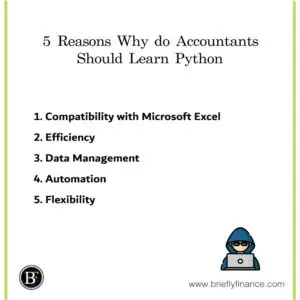Due to growing amount of data, there are a less tools that can help accountants do the necessary analysis. Additionally, these technologies don’t cover the whole process, and can’t be automated. On the other hand, programming languages are free, and analysis is a repeatable process.
For accountants, Python is a user-friendly programming language. It is an essential method for processing data and conducting statistical analysis.

Attribution: The icons has been designed using resources from flaticon.com
The initial release date of Python was February 20, 1991. In recent years, its popularity has significantly expanded. In fact, it overtook JavaScript in usage early in 2020.
Its adaptability and usability can be attributed to its appeal. Its design idea uses English-like grammar and places a premium on readability, simplicity, and white space. Since it is simpler to learn than other languages, many newcomers start with Python. Technically speaking, this simplicity also increases programmers’ productivity.
Python is frequently used to create web applications, communicate with databases, and manage data flow. Python is frequently used to create interactive games or systems that scrape huge amounts of data from websites.
1. Compatibility with Microsoft Excel
As you may have already noticed, Excel is a need for accountants. And while Excel has long been a mainstay of the larger business community, accountants and other business professionals are just now beginning to discover how programming languages may help Excel’s already-broad capabilities. Python is suitable for it.
There are primarily two methods for converting from Excel to Python (and back). In the first case, a Python script is directly invoked from VBA, whereas in the second case, a User Defined Function is used. Visit this webpage link if you’re interested in learning more about the integration.
2. Efficiency
Accountants will learn how to use Python programming to free up their workday from monotonous and repetitive duties, allowing them to reinvest their time savings on more vital tasks like making crucial decisions or taking longer lunch breaks to work out.
3. Data Management
In terms of accounting, handling the data is where Python shines. Practically any type, both structured and unstructured, can be read by it. It can handle massive volumes of data and has strong capabilities for data importing and modification, including activities like merging and recoding.
It is used, for instance, in tasks that require extracting data from an Excel sheet, altering it, and then re-entering it into another spreadsheet.
4. Automation
Automation can be done with Python. For instance, using Excel would necessitate manually opening a new file each week and adding the formulas and other necessary components each time the same analysis needed to be conducted on a fresh set of sales data.
You might employ Power Query or Visual Basic for Applications. However, you could perform the same automatically in a language like Python by creating a straightforward script that imports new data, executes the analysis once each week, and outputs the results in the desired format.
5. Flexibility
Python’s flexibility makes it simple to use for beginners, intermediate users, and experts. It is perfect for managing business costs and enhancing overall performance due to its effectiveness in enabling reusable constructions and straightforward syntaxes.
Its versatility is multifaceted in that it supports several operating systems in a straightforward manner. You can create several Python programming programs as an accountant that work across various platforms.
What other language should I learn as an accountant?
Typically, you could start with Visual Basic for Applications (VBA) and then with Python. The cause? Application across the board and portability even if programming languages like Python are usually preferable, you must install the language’s library and a code editing program like Visual Studio on your PC.
The majority of IT departments, not to mention the IT departments of your clients, won’t install unauthorised programs. However, Excel and the office suite are practically universal. On virtually any computer with Excel installed, you may create and execute a VBA program or macro without requiring any specialised IT permissions (the exception is Macs, which have a degraded version of Excel, but that’s a different sin for another debate).
Additionally, VBA comes with A LOT of high-level capability that is already built-in; you hardly ever need to create your own classes or use complex programming techniques. You probably only need to use VBA to automate a few manual procedures for an accounting job.
And finally, VBA is fairly simple to understand and troubleshoot. Since it was created in the early 1990s, according to what I recall, there are decades worth of readily Googleable queries on just about every topic or issue relating to VBA.
Final Thoughts
Depending on the role, learning a language like Python will have different practical advantages. Coding is more and more likely to become a component of an accountant’s profession when they deal with a lot of data. Even though many accountants won’t need programming expertise in their day-to-day employment, it’s still beneficial to understand how coding functions and cultivate the logical thinking that it requires.
Related Posts:
- 6 Reasons Why Accountants Should Learn to Code
- Is Accounting Just Like Math? 4 Difference Between them
- Is Accounting a good job for the future?
Disclaimer: Above links are affiliate links and at no additional cost to you. I may earn a commission. Know that I only recommend products, tools, services and learning resources I’ve personally used and believe are genuinely helpful and relevant. It is not because of the small commissions I make if you decide to purchase them. Most of all, I would never advocate for buying something that you can’t afford or that you’re not yet ready to implement.

